On Physical Labor
劳动英文作文中考
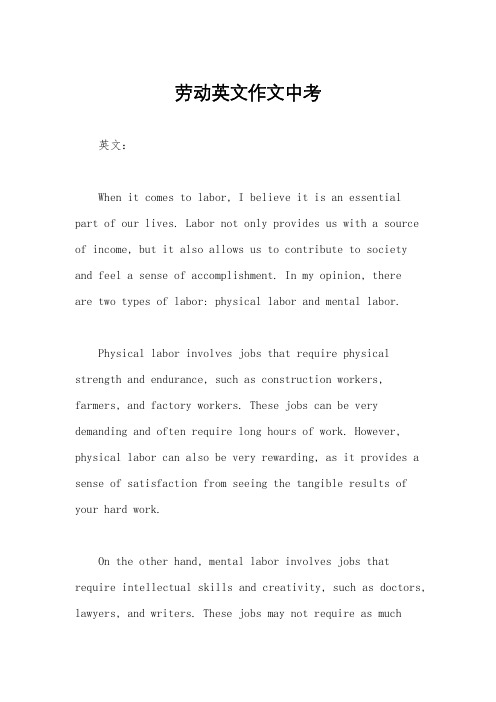
劳动英文作文中考英文:When it comes to labor, I believe it is an essentialpart of our lives. Labor not only provides us with a source of income, but it also allows us to contribute to society and feel a sense of accomplishment. In my opinion, thereare two types of labor: physical labor and mental labor.Physical labor involves jobs that require physical strength and endurance, such as construction workers, farmers, and factory workers. These jobs can be very demanding and often require long hours of work. However, physical labor can also be very rewarding, as it provides a sense of satisfaction from seeing the tangible results of your hard work.On the other hand, mental labor involves jobs that require intellectual skills and creativity, such as doctors, lawyers, and writers. These jobs may not require as muchphysical strength, but they can be mentally taxing and require a high level of concentration. Mental labor canalso be very rewarding, as it allows individuals to usetheir skills and knowledge to solve complex problems and make a difference in the world.Overall, I believe that both physical and mental labor are important and necessary for society to function.Without physical labor, we would not have theinfrastructure and goods that we rely on every day. Without mental labor, we would not have the innovations and advancements that improve our quality of life.中文:谈到劳动,我认为它是我们生活中必不可少的一部分。
英语作文志愿参加农场劳动
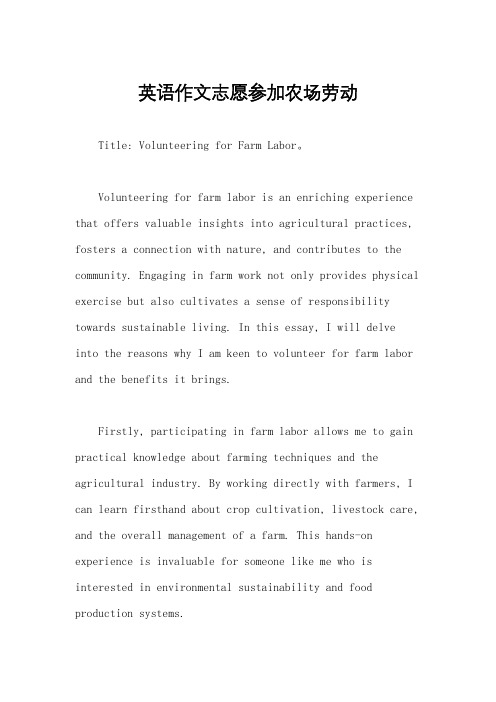
英语作文志愿参加农场劳动Title: Volunteering for Farm Labor。
Volunteering for farm labor is an enriching experience that offers valuable insights into agricultural practices, fosters a connection with nature, and contributes to the community. Engaging in farm work not only provides physical exercise but also cultivates a sense of responsibility towards sustainable living. In this essay, I will delveinto the reasons why I am keen to volunteer for farm labor and the benefits it brings.Firstly, participating in farm labor allows me to gain practical knowledge about farming techniques and the agricultural industry. By working directly with farmers, I can learn firsthand about crop cultivation, livestock care, and the overall management of a farm. This hands-on experience is invaluable for someone like me who is interested in environmental sustainability and food production systems.Moreover, volunteering on a farm provides an opportunity to reconnect with nature and appreciate the beauty of the natural world. Spending time outdoors, surrounded by fields, trees, and animals, offers a refreshing break from the hustle and bustle of urban life. It allows me to develop a deeper understanding of the interconnectedness between humans and the environment, fostering a sense of stewardship towards the Earth.Additionally, participating in farm labor fosters a sense of community and collaboration. Working alongside other volunteers and farmers towards a common goal creates a bond based on shared experiences and mutual respect. The camaraderie forged during long days of laboring in the fields strengthens interpersonal relationships and cultivates a spirit of teamwork.Furthermore, volunteering for farm labor is a meaningful way to contribute to the local community and support sustainable agriculture. By assisting farmers with various tasks such as planting, harvesting, and tending toanimals, I can directly contribute to the production of fresh, organic produce and promote environmentally-friendly farming practices. This, in turn, helps to strengthen the local food system and reduce reliance on mass-produced, industrially farmed goods.In addition to the practical benefits, volunteering for farm labor offers personal growth and self-reflection opportunities. Engaging in physical labor outdoors provides a sense of accomplishment and satisfaction, enhancing self-esteem and mental well-being. Moreover, the tranquil environment of the farm provides a conducive space for introspection and mindfulness, allowing me to recharge and reflect on my values and priorities in life.In conclusion, volunteering for farm labor is a rewarding experience that offers numerous benefits for personal, social, and environmental well-being. By actively participating in agricultural activities, I can gain practical skills, reconnect with nature, foster community spirit, support sustainable agriculture, and promote personal growth. Thus, I am eager to embark on this journeyof farm labor volunteering and contribute to the thriving agricultural community.。
劳动强壮我们的身体英语作文
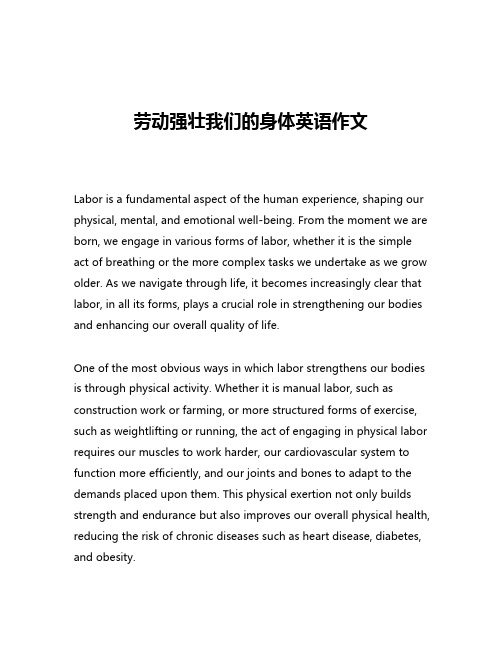
劳动强壮我们的身体英语作文Labor is a fundamental aspect of the human experience, shaping our physical, mental, and emotional well-being. From the moment we are born, we engage in various forms of labor, whether it is the simple act of breathing or the more complex tasks we undertake as we grow older. As we navigate through life, it becomes increasingly clear that labor, in all its forms, plays a crucial role in strengthening our bodies and enhancing our overall quality of life.One of the most obvious ways in which labor strengthens our bodies is through physical activity. Whether it is manual labor, such as construction work or farming, or more structured forms of exercise, such as weightlifting or running, the act of engaging in physical labor requires our muscles to work harder, our cardiovascular system to function more efficiently, and our joints and bones to adapt to the demands placed upon them. This physical exertion not only builds strength and endurance but also improves our overall physical health, reducing the risk of chronic diseases such as heart disease, diabetes, and obesity.Moreover, the mental and emotional benefits of labor should not be overlooked. When we engage in meaningful work, whether it is a job or a personal project, we experience a sense of purpose and accomplishment that can have a profound impact on our mental well-being. This sense of purpose can help to alleviate feelings of anxiety, depression, and stress, which can have a detrimental effect on our physical health. Additionally, the social connections and sense of community that often come with labor can provide a valuable source of emotional support, further contributing to our overall well-being.It is important to note, however, that not all forms of labor are equally beneficial to our physical and mental health. Some types of labor, such as sedentary desk jobs or highly stressful work environments, can actually have a negative impact on our well-being. In these cases, it is crucial to find ways to incorporate physical activity and stress-reducing practices into our daily routines, such as taking regular breaks, engaging in exercise, or practicing mindfulness and relaxation techniques.Furthermore, the way in which we approach labor can also have a significant impact on its benefits. When we approach our work with a positive attitude, a sense of purpose, and a willingness to learn and grow, we are more likely to experience the positive effects of labor on our physical and mental health. Conversely, when we approachour work with a negative attitude, a sense of dread, or a lack of motivation, we may miss out on these benefits or even experience negative consequences.In conclusion, labor is a fundamental aspect of the human experience that plays a crucial role in strengthening our bodies and enhancing our overall well-being. Whether it is physical labor, mental labor, or a combination of the two, the act of engaging in meaningful work can have a profound impact on our physical, mental, and emotional health. By embracing labor with a positive attitude and a commitment to self-care, we can unlock the full potential of this powerful force and live healthier, more fulfilling lives.。
高二英语下册词组句型归纳

高二英语下册词组句型归纳unit 161. mental and physical labor 脑力与体力劳动physical examination 体检in good physical condition 身体状况良好2. suffer from 遭受… suffer from headache / floods suffera great loss 遭受巨大损失suffer for one's carelessness 因马虎而受苦3. be greedy for / of knowledge 渴求学问be greedy to do = be eager to do 渴望干某事4. get employment 就业lose employment 失业employment agency 职业介绍所5. civil unrest 内乱post-war 战后be under construction = be being built 在建立中6. make sacrifices 作出牺牲at the sacrifice of… 以牺牲…为代价7. bring justice to 依法判处… a war of justice 正义斗争8. in vain 徒劳be vain of = be proud of 以…为傲慢try in vain to do sth 枉费心机做某事9. eventually = at last = in the end 最终/ 最终10. take a chance 冒险/ 碰运气take apart 拆开take down 拆掉take in 吸取/欺瞒take on 呈现/ 雇佣担当take change of = be in charge of 负责take great trouble to do sth 不辞辛苦做某事take over 接收take up 起先从事/ 占据take possession of 占有take to 起先宠爱take for 误以为take away 剥夺11. overcome = get over 克制/战胜12. leave alone 忽视/不打扰leave the door open 不要关门leave behind 留下/不带走leave out 漏掉leave off 停顿/脱掉leave for = start out for 动身往leave sth to sb 把…留给某人leave aside 搁置on leave 休假ask for leave 请假fall behind 落后behind the times 过时/ 跟不上时代remain / stay behind 留下leave word 留言leave + 宾语+ doing 使…处于某状态13. insist on doing = persist in doing 坚持做…14. as a result of = because of = owing to = due to = thanks to 由于… without result 毫无结果result in = lead to 导致/ 结果result from 起因于… as a result 结果15. on sale 出售/减价for sale 待售cultural diversity 多元文化16. in turn 反过来/ 轮番turn away from = turn off 避开turn in = hand in 上交turn out (to be) = prove to be 结果是turn over 翻过去/反复考虑turn up 出现turn to sb for help = ask sb for help take turns to do sth 轮番做某事out of turn 不合时宜take one's turns 轮班on the turn 将好转turn down 拒绝/ 调低17. supply sth for / to sb = supply sb with sth 供应某人某物be in short supply 供应短缺a good supply of food 大量的食物18. a chain of 一连串a series of 一系列19. be willing to help others = be ready to help others 乐于助人20. struggle to do sth = try one's best to do sth 努力做某事21. civil rights movement 民权运动the great depression 经济大萧条时期22. 尽管/ 虽然:despite = in spite of = regardless of + 短语although = though = while + 从句23. burn with anger 怒火中烧burn away 烧毁/ 消散burn down = burn to the ground烧毁burn out 烧坏burn up 烧光/ 烧得更旺24. recover from 从…复原过来recover one's sight 复原视力recover oneself = come to one's sensecome to one's life = come to oneself = revive 复原知觉25. aim at doing = aim to do 旨在… aim at(表动作)= be aimed at (表状态)we are studying hard, aimed at attending universities. 26. display new image 呈现新面貌in huge numbers = in large numbers 大规模的27. be determined to do = determine to do = decide to do = make a decision to do = make up one's mind to do determine on (doing) sth 决心干某事28. gather roots 采集根茎gather in = harvest 收割gather up 整理起来/ 聚集29. be forced to do = have to do 被迫做某事move away 搬走put away 整理/ 储蓄give away 分发/ 泄密clear away 去除tear oneself away 忍痛舍去turn away 把…打发走/ 辞退30. make / reach / arrive at / come to an agreement with 与…达成协议31. all the while 始终/始终for a little while 持续了一会儿in a little while 一会儿后once in a while 有时worth one while 值得at while = at times 有时32. die away (风)停下来/ 安静die down (声音/光)消逝/ 渐熄die out 灭亡die for sth = die to do sth = be eager to do sth 渴望 (i)off 枯死/ 绝种die of hunger / illness / disease / old age… 死于内部因素die from lack of food / a wound / an accident / over-work 死于外部因素33. live on = feed on 以…为生live by 靠…生活live through 阅历live up to 到达/ 不辜负/ 符合live / lead a simple life. 过朴实的生活34. cut across 走捷径cut away 切除/ 逃走cut back on 削减cut down 削减/ 砍倒cut in 插嘴cut out 删掉/ 停顿cut through 穿过cut up 切碎/ 使苦痛cut into pieces 切成碎片cut off 切断/ 中止be cut out for = be fit for = be suitable for 适合于35. be in effect 有效/生效in effect = in fact = as a matter of fact = in reality 事实上come into effect = go into effect 生效without effect 没有作用put… into effect = bring….into effect = carry… into effect 使…生效36. 假如:suppose = supposing = as long as = provided = on condition that = providing = assuming = ifsuppose (用于祈使语气或此时此刻分词,同if)suppose it rains, what's to be done supposing (that) she doesn't come, we will still go.37. not +all/both/every/everyone/everybody/everything/everywhe re 局部否认none/neither/nobody/nothing/no one/never/not┉any全部否认我不全相识他们:i don't know all of them.他们我全不相识:i don't know any of them.= i know none of them局部否认:both of them are not my brothers.= either of them is my brother.全部否认:neither of them is my brother.★not every one of them / us / you is polite to me38. i bought the gold necklace for 2500 yuan. = my gold necklace cost me 2500 yuan.=it took me 2500 yuan to buy the gold necklace. = i paid 2500 yuan for the gold necklace.=i spent 2500 yuan on / in buying the gold necklace.。
Unit3词汇拓展及短语清单-高中英语牛津译林版(2020)选择性
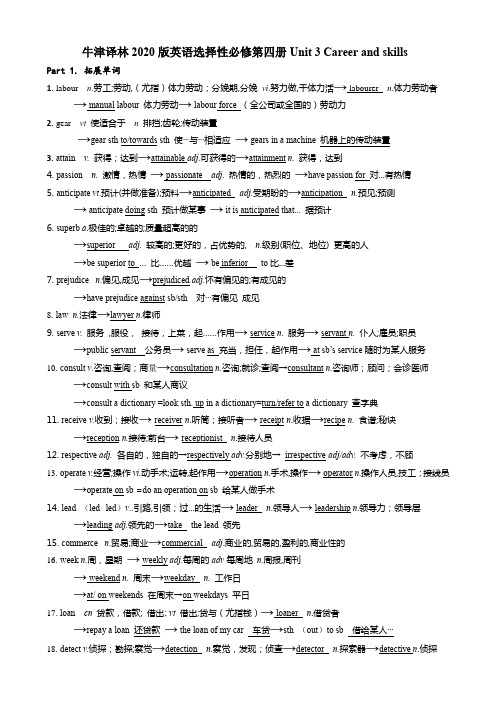
牛津译林2020版英语选择性必修第四册Unit 3 Career and skillsPart 1. 拓展单词bour n.劳工;劳动,(尤指)体力劳动;分娩期,分娩vi.努力做,干体力活→ labourer n.体力劳动者→ manual labour 体力劳动→ labour force (全公司或全国的)劳动力2.gear vt使适合于n 排挡;齿轮;传动装置→gear sth to/towards sth使···与···相适应→ gears in a machine 机器上的传动装置3.attain v.获得;达到→attainable adj.可获得的→attainment n.获得,达到4.passion n.激情,热情→ passionate adj. 热情的,热烈的→have passion for对...有热情5.anticipate vt.预计(并做准备);预料→anticipated adj.受期盼的→anticipation n.预见;预测→ anticipate doing sth 预计做某事→ it is anticipated that... 据预计6.superb a.极佳的;卓越的;质量超高的的→superior adj. 较高的;更好的,占优势的, n.级别(职位、地位) 更高的人→be superior to …比……优越→ be inferior to比...差7.prejudice n.偏见,成见→prejudiced adj.怀有偏见的;有成见的→have prejudice against sb/sth 对···有偏见成见w n.法律→lawyer n.律师9.serve v.服务,服役,接待,上菜,起……作用→ service n. 服务→ servant n.仆人;雇员;职员→public servant 公务员→ serve as 充当,担任,起作用→ at sb’s service随时为某人服务10.consult v.咨询,查阅;商量→consultation n.咨询;就诊;查阅→consultant n.咨询师;顾问;会诊医师→consult with sb 和某人商议→consult a dictionary =look sth. up in a dictionary=turn/refer to a dictionary 查字典11.receive v.收到;接收→receiver n.听筒;接听者→receipt n.收据→recipe n.食谱;秘诀→reception n.接待;前台→receptionist n.接待人员12.respective adj.各自的,独自的→respectively adv.分别地→irrespective adj/adv.不考虑,不顾13.operate v.经营;操作vi.动手术;运转,起作用→operation n.手术,操作→ operator n.操作人员,技工;接线员→operate on sb =do an operation on sb 给某人做手术14.lead (led--led)v..引路,引领;过...的生活→ leader n.领导人→ leadership n.领导力;领导层→leading adj.领先的→take the lead 领先merce n.贸易;商业→commercial adj.商业的,贸易的,盈利的,商业性的16.week n.周,星期→ weekly adj.每周的adv每周地n.周报,周刊→ weekend n.周末→weekday n.工作日→at/ on weekends 在周末→on weekdays平日17.loan cn贷款,借款; 借出; vt 借出;贷与(尤指钱)→ loaner n.借贷者→repay a loan 还贷款→ the loan of my car 车贷→sth (out)to sb 借给某人···18.detect v.侦探;勘探;察觉→detection n.察觉,发现;侦查→detector n.探索器→detective n.侦探19.subject n.主题,科目,主语v.易遭受→subjection n.服从,征服,隶属→ subjective adj.主观的,个人的→ subjectively adv.主观地→objective ad j.客观的20.direct v.指导;导演a/v直接的(地);径直的(地)→indirect a. 间接的→direction n. 方向,说明→ director n.主管;主任;导演→directory n.名录,电话号码簿,公司名录→ directly adv. 直接地,恰好地;坦率地conj.一.......就21.institute n机构,机构建筑vt建立,制定(体系政策等)→ institution n (大学银行等规模大的)机构,慈善机构22.qualify v. 使具有资格→ qualification n. 资格,学历;学历;合格,达到标准→qualified adj.有资格的→ be qualified for 有资格做,可胜任的23.apply v.申请;使用;将……投入→ application n.申请(书),应用程序→ applicant n.申请人→ applicable adj.能应用的;可适用的→ appliance n.工具,器械→ applied physics 应用物理→ apply for 申请→ apply to 应用→apply oneself to (doing) sth.专心于= address oneself to24.prior adj.在前的,优先的,占先的→priority n.优先;优先权→ prior to 在...之前→ give priority to 优先考虑→take/have priority over 比...有优先权25.criterion n.标准,准则,原则→criteria pl.标准,准则,原则26.concise adj简明的,简练的,简洁的→concisely adv简明地;简练地;简洁地27.shave (s haved, shaved或shaven) v.刮(脸,胡子)→shaver n.剃须刀→have a good shave好好刮胡子28.refresh v.恢复精神→refreshed adj.精神焕发的;恢复了精力的29.rude adj.无理的, 粗鲁的→rudely adv. 粗暴地,无礼地→ rudeness n.无礼,粗蛮30.justify vt.对...做出解释,为...辩解;证明...正确→ justification n.正当理由→justified adj.有正当理由的→ justice n.正义;公正;司法→do justice to 公正处理...→justify doing sth 证明做某事正确→be justified in doing sth有正当理由做某事31.relevant adj有关的;切题的→relevance n.关联;适当→irrelevance n.不相关的,无关紧要的→be relevant to = have relevance to与...有关32.infer v.推断→inference n.推断;推论→infer from 从...推断出33.convey vt 表达,传递;传送,运送→ conveyance n传送,运送→convey sth from···to···把...运送到...34.firm adj.坚硬的;坚定的n.公司,商行→firmly adv.坚定地;牢牢地35.genuine adj.真诚的,名副其实的→genuinely adv真诚地36.yawn vi 打哈欠→ yawning n哈欠37.corporate a公司的;全体的;共同的→corporation n.(大)公司38.temporary adj.暂时的;临时的→temporarily adv.暂时地→(opp.)permanent adj.永久的Part 2. 核心短语1.be beneficial to the public对公众有益2.the spirit of craftsmanship 工匠精神3.not least 尤其4.financially independent 经济独立bour force 劳动力6.earn a living 谋生7.by no means 绝不8.enter the world of work 进入职场9.attain our goals 实现我们的目标10.purse one’s dream 追求梦想11.in the direction of 朝着……的方向12.be engaged in 从事;参与;忙于13.be fond of 喜爱14.a great sense of achievement and satisfaction有强烈的成就感和满足感15.provide room for personal growth为个人成长提供空间16.excel in what we do使我们在所从事的事情上出类拔萃17.move along our chosen career path沿着我们所选的职业路径前进18.meet with 偶遇19.in common hours 在平常时刻20.be satisfied with the status quo对现状感到满意21.better adapt ourselves to new circumstances更好的适应环境22.contribute to 有助于23.at the most basic level 从基础的层面来看24.equally important 同样重要25.be superior to 优于26.have prejudice against 对……有偏见27.make our respective contributions做出各自的贡献28.step out of their comfort zone走出他们的舒适区mit one’s to doing 投身到30.for the benefit of 为了……的利益y out 安排32.make a life 创造生活33.be essential for 对……至关重要34.our individual well-being 我们的个人幸福35.as a whole 总体来说36.model workers 劳动模范37.witness massive changes 见证巨变38.intense physical labour繁重的体力劳动39.keep up with new technologies跟上新技术的脚步40.place a greater emphasis on continuous training更加强调持续培训41.not necessarily 未必42.move sideways 平级调动43.individual skills 个人技术44.be attached to 被附属于45.put a heavy focus on …非常重视……46.sharpen our ability to adapt提高我们的适应能力47.software programming 软件编程48.interact with 与……互动49.on the whole 总的来说;大体上50.in general总的来说51.generalize ideas 总结观点52.keep track of 记录下来53.receipts and payments收支情况54.get started 开始55.work around the clock 日以继夜地工作56.nice and novel 好看又新颖57.have great talent for 有天赋bine…with…把…与…结合59.be familiar with 对…熟悉60.after much thought 经仔细考虑61.more is better 越多越好62.when is comes to 当谈到63.try one’s hand 尝试64.swing into action 立刻行动65.decide on a career 选定一份职业66.do some detective work做一些调查工作67.rely on your subjective judgement依赖你的主观判断68.look through the business directory浏览企业名录69.help plug the knowledge or skill gaps有助于弥补知识和技能不70.go for a job interview 参加求职面试71.gain the upper hand 占据上风72.set of f 动身73.step into the world of employment 踏入职场74.prior to在……之前75.make good preparations 做充足准备76.list your strengths and skills列出你的优势和技能77.analyse your weakness 分析你的弱点78.better yet 更好的是79.practice makes perfect 熟能生巧80.keep at it 坚持下去81.present your best self 展现最好的自我82.make a good first impression给某人留下好的第一印象83.for the duration of 在……期间84.get a complete picture 对……有全面了解85.be specific about 详细地说明86.genuine smile 真诚的微笑87.make constant eye contact 保持眼神交流88.keep your back straight 保持背部挺直89.seize the moment 抓住机会90.an interview is a two-way street面试是双向的91.bring up 提出;抚养;呕吐92.in emerging markers 新兴市场93.follow it up 跟近94.look back on the process 回顾整个过程95.put your best foot forward 全力以赴96.reach the end of the rainbow 理想的彼岸97.have a real passion for 对…有热情98.temporary work 暂时的工作99.sporting events 体育赛事100.be drawn to 被……吸引。
体力劳动(Physical Labor)
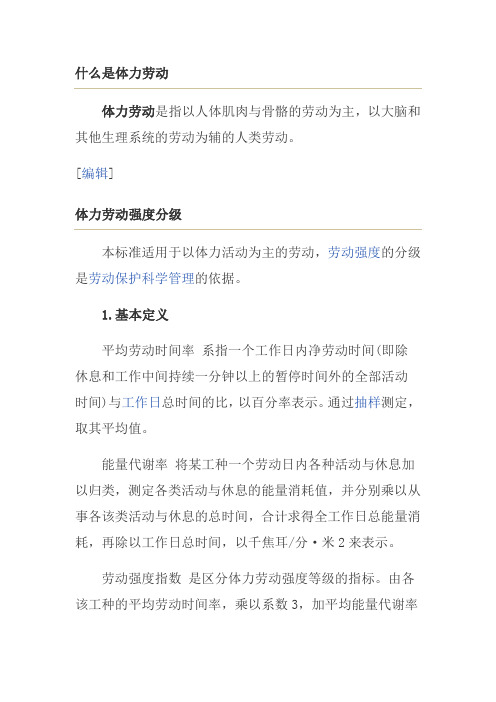
什么是体力劳动体力劳动是指以人体肌肉与骨骼的劳动为主,以大脑和其他生理系统的劳动为辅的人类劳动。
[编辑]体力劳动强度分级本标准适用于以体力活动为主的劳动,劳动强度的分级是劳动保护科学管理的依据。
1.基本定义平均劳动时间率系指一个工作日内净劳动时间(即除休息和工作中间持续一分钟以上的暂停时间外的全部活动时间)与工作日总时间的比,以百分率表示。
通过抽样测定,取其平均值。
能量代谢率将某工种一个劳动日内各种活动与休息加以归类,测定各类活动与休息的能量消耗值,并分别乘以从事各该类活动与休息的总时间,合计求得全工作日总能量消耗,再除以工作日总时间,以千焦耳/分·米2来表示。
劳动强度指数是区分体力劳动强度等级的指标。
由各该工种的平均劳动时间率,乘以系数3,加平均能量代谢率乘以系数7求得。
指数大反映劳动强度大,指数小反映劳动强度小。
2.体力劳动强度分级体力劳动强度按劳动强度指数大小分为四级。
体力劳动强度级别劳动强度指数Ⅰ <15Ⅱ~20Ⅲ~25Ⅳ >25∙Ⅰ级体力劳动 8小时工作日平均耗能值为3558.8千焦耳/人,劳动时间率为61%,即净劳动时间为293分钟,相当于轻劳动。
∙Ⅱ级体力劳动 8小时工作日平均耗能值为5560.1千焦耳/人,劳动时间率为67%,即净劳动时间为320分钟,相当于中等强度劳动。
∙Ⅲ级体力劳动 8小时工作日平均耗能值为7310.2千焦耳/人,劳动时间率为73%,即净劳动时间为350分钟,相当于重强度劳动。
∙Ⅳ级体力劳动 8小时工作日平均耗能值为11304.4千焦耳/人,劳动时间率为77%,即净劳动时间为370分钟,相当于“很重”强度劳动。
[编辑]体力劳动与脑力劳动的对立脑力劳动是以消耗脑力为主的劳动,体力劳动则是以消耗体力为主的劳动。
在原始社会的漫长时期,脑力劳动与体力劳动是结合在一起的,社会上没有人专门从事脑力劳动。
在原始社会向奴隶社会过渡的时期,随着社会分工的发展,随着私有制和阶级的出现,脑力劳动逐渐从体力劳动中分离出来,开始出现了脑力劳动与体力劳动的差别。
take、takepartin、join、joinin和attend都有什么区别?

take、takepartin、join、joinin和attend都有什么区别?join, join in, take part in和attend的用法比较这几个词或短语都有“参加”的意思,但用法不同。
一,join有两个用法:(1)指加入某个党派,团体组织等,成为其成员之一,意为:“参军、入团、入党”等。
如:When did your brother join the army? 你哥哥什么时候参军的?She joined the Young Pioneers. 她加入了少先队。
(2)和某人一道做某事,其结构为:join sb. In (doing) sth.,根据上下文,in (doing) sth. 也可以省去Will you join us in the discussion? 你参加我们的讨论吗?He'll join us in singing the song. 他将和我们一道唱歌。
We're going to the East Lake Park on Sunday. Will you join us?我们打算星期天去东湖公园。
你跟我们一道去好吗?二, join in多指参加小规模的活动如“球赛、游戏”等,常用于日常口语。
如:Come along, and join in the ball game. 快,来参加球赛。
Why didn't you join in the talk last night? 昨晚你为什么没参加座谈?三, take part in 指参加会议或群众性活动等,着重说明句子主语参加该项活动并在活动中发挥作用。
We'll take part in social practice during the summer vacation. 暑假期间我们将参加社会实践。
We often take part in physical labor. 我们经常参加体力劳动。
过去与现在的对比英语作文50个单词
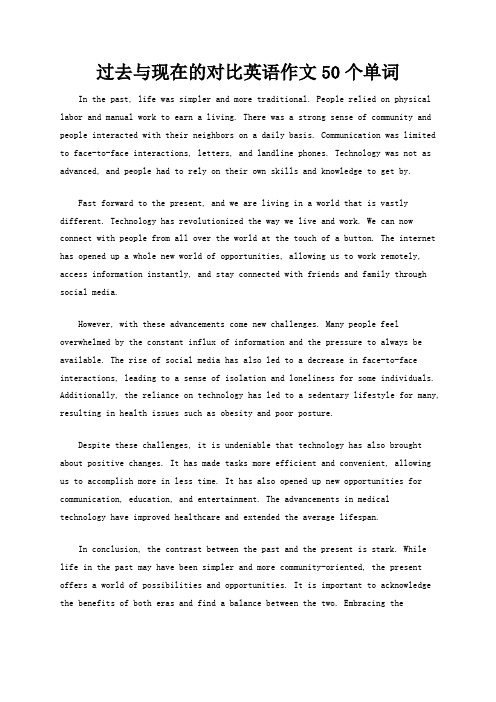
过去与现在的对比英语作文50个单词In the past, life was simpler and more traditional. People relied on physical labor and manual work to earn a living. There was a strong sense of community and people interacted with their neighbors on a daily basis. Communication was limited to face-to-face interactions, letters, and landline phones. Technology was not as advanced, and people had to rely on their own skills and knowledge to get by.Fast forward to the present, and we are living in a world that is vastly different. Technology has revolutionized the way we live and work. We can now connect with people from all over the world at the touch of a button. The internet has opened up a whole new world of opportunities, allowing us to work remotely, access information instantly, and stay connected with friends and family through social media.However, with these advancements come new challenges. Many people feel overwhelmed by the constant influx of information and the pressure to always be available. The rise of social media has also led to a decrease in face-to-face interactions, leading to a sense of isolation and loneliness for some individuals. Additionally, the reliance on technology has led to a sedentary lifestyle for many, resulting in health issues such as obesity and poor posture.Despite these challenges, it is undeniable that technology has also brought about positive changes. It has made tasks more efficient and convenient, allowing us to accomplish more in less time. It has also opened up new opportunities for communication, education, and entertainment. The advancements in medicaltechnology have improved healthcare and extended the average lifespan.In conclusion, the contrast between the past and the present is stark. While life in the past may have been simpler and more community-oriented, the present offers a world of possibilities and opportunities. It is important to acknowledge the benefits of both eras and find a balance between the two. Embracing theadvancements of the present while cherishing the values of the past can lead to a more fulfilling and well-rounded life.。
关于我认为做劳动的英语作文
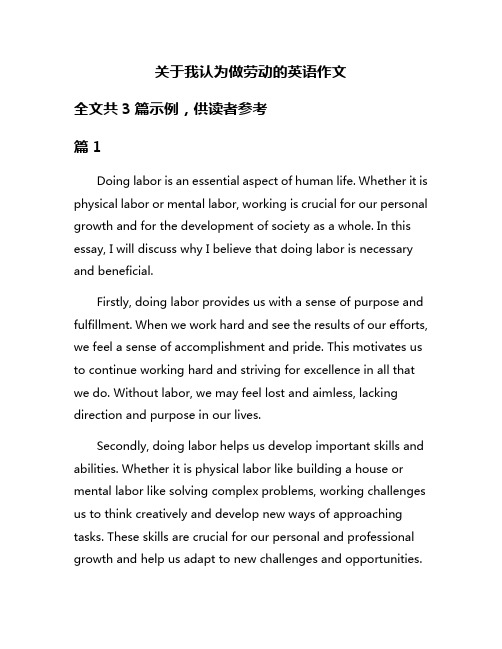
关于我认为做劳动的英语作文全文共3篇示例,供读者参考篇1Doing labor is an essential aspect of human life. Whether it is physical labor or mental labor, working is crucial for our personal growth and for the development of society as a whole. In this essay, I will discuss why I believe that doing labor is necessary and beneficial.Firstly, doing labor provides us with a sense of purpose and fulfillment. When we work hard and see the results of our efforts, we feel a sense of accomplishment and pride. This motivates us to continue working hard and striving for excellence in all that we do. Without labor, we may feel lost and aimless, lacking direction and purpose in our lives.Secondly, doing labor helps us develop important skills and abilities. Whether it is physical labor like building a house or mental labor like solving complex problems, working challenges us to think creatively and develop new ways of approaching tasks. These skills are crucial for our personal and professional growth and help us adapt to new challenges and opportunities.Furthermore, doing labor is important for the functioning of society. Without people willing to work hard and contribute their talents and skills, our society would not be able to function effectively. Labor creates value and wealth, which is essential for sustaining and improving our quality of life.In conclusion, I believe that doing labor is essential for our personal growth and for the development of society. Through hard work and dedication, we can achieve our goals and contribute to the betterment of the world around us. Let us embrace labor and strive to make a positive impact through our efforts.篇2Why I Believe in the Value of LaborIn today's fast-paced and technology-driven world, the importance of labor is often overlooked or underestimated. However, I firmly believe that doing labor is not only necessary for personal and societal development, but it also holds immense value and significance. In this essay, I will elaborate on why I believe in the importance of labor and how it contributes to individual growth, community prosperity, and overall societal well-being.First and foremost, labor is essential for personal growth and development. When one engages in labor, whether it be physical or mental, one is able to cultivate valuable skills, knowledge, and experience. By working hard and putting in the effort, individuals are able to learn new things, develop a strong work ethic, and build self-discipline. Through labor, people are able to challenge themselves, push their limits, and achieve personal growth and fulfillment. As the saying goes, "No pain, no gain" - it is through laborious efforts that individuals are able to reach their full potential and become the best version of themselves.Secondly, labor plays a crucial role in fostering economic prosperity and community development. Without labor, no progress or advancement can be made. Labor is at the heart of any economy, driving production, innovation, and growth. Whether it is manufacturing goods, providing services, or conducting research, labor is the driving force behind all economic activities. In addition, labor creates jobs, generates income, and boosts consumption, leading to a flourishing economy and improved living standards for all members of society. Furthermore, labor builds social connections, fosters collaboration, and strengthens communities. By working together towards common goals, people are able to createstrong bonds and build a sense of solidarity and unity within their communities.Lastly, labor is essential for the overall well-being and sustainability of society as a whole. Without labor, there would be no food on the table, no clothes on our backs, and no roofs over our heads. Labor is what sustains and supports our daily lives and ensures our basic needs are met. Furthermore, labor is crucial for addressing pressing social issues, such as poverty, inequality, and environmental degradation. By engaging in labor that is socially responsible, environmentally sustainable, and ethically sound, individuals and communities can contribute to building a better and brighter future for all.In conclusion, I firmly believe that doing labor is not only important but indispensable for personal growth, community prosperity, and societal well-being. Labor is what drives progress, fosters development, and sustains our livelihoods. It is through hard work, dedication, and commitment that individuals are able to achieve their goals, fulfill their dreams, and make a positive impact on the world. As we continue to navigate the complexities of the modern world, let us never forget the value and significance of labor, and let us always strive to work hard, contribute meaningfully, and make a difference in the world.篇3Title: My Thoughts on LaborLabor is a fundamental aspect of human existence, and I believe that engaging in work is not only necessary for survival but also essential for personal growth and fulfillment. Throughout history, labor has been intrinsic to the development and progress of societies, shaping our collective experience and defining our identities as individuals. In this essay, I will discuss why I think that doing labor is important and how it can contribute to a meaningful life.First and foremost, engaging in labor provides a sense of purpose and meaning to our lives. As social beings, we have a natural inclination to contribute to the well-being of our communities and make a positive impact on the world around us. Through work, we are able to utilize our skills and talents to address societal needs and challenges, thereby creating value and significance in our lives. Whether we are farmers cultivating crops, teachers educating students, or healthcare workers caring for patients, our labor allows us to make a meaningful difference in the lives of others and leave a lasting legacy for future generations.Furthermore, labor enables us to develop a strong work ethic and cultivate important virtues such as diligence, perseverance, and discipline. By facing challenges and overcoming obstacles in our work, we can build resilience and character, honing our abilities to adapt to changing circumstances and thrive in adversity. Through hard work and dedication, we can achieve personal growth andself-improvement, realizing our full potential and fulfilling our aspirations. As the saying goes, “No pain, no gain”—it is through labor that we can attain success and fulfillment in our endeavors.In addition, doing labor fosters a sense of community and solidarity among individuals, promoting collaboration and cooperation in the pursuit of common goals. When we work together with others towards a shared purpose, we enhance our sense of belonging and create bonds of friendship and camaraderie that enrich our lives. Through collective efforts and mutual support, we can achieve greater outcomes and make a positive impact on the world around us. By valuing the contributions of each individual and recognizing the importance of teamwork, we can create a more compassionate and inclusive society where every person is valued and respected for their unique talents and contributions.Moreover, labor is not just about the physical act of working; it is also about finding joy and fulfillment in what we do. When we are passionate about our work and derive satisfaction from our achievements, we experience a sense of fulfillment and purpose that enriches our lives and motivates us to pursue our goals with enthusiasm and dedication. Whether we are artists creating beautiful works of art, entrepreneurs innovating new products and services, or volunteers helping those in need, our labor can bring us joy and fulfillment that transcends the everyday challenges and struggles we face.In conclusion, I believe that doing labor is essential for personal growth, societal progress, and human flourishing. By engaging in work that is meaningful, challenging, and fulfilling, we can contribute to the well-being of our communities, develop important virtues and skills, foster a sense of belonging and solidarity, and find joy and fulfillment in our endeavors. Through our labor, we can make a positive impact on the world and leave a lasting legacy that reflects our values, passions, and aspirations. As we continue to strive for excellence and pursue our dreams with dedication and perseverance, let us embrace the power of labor to transform our lives and create a better future for all.。
脑力劳动和体力劳动的区别英语作文
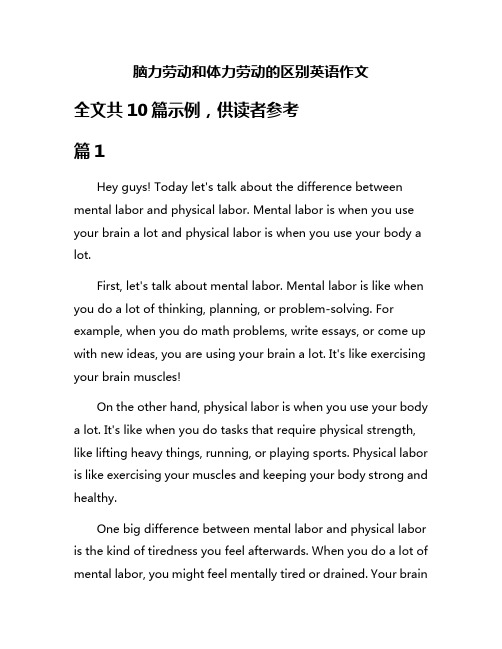
脑力劳动和体力劳动的区别英语作文全文共10篇示例,供读者参考篇1Hey guys! Today let's talk about the difference between mental labor and physical labor. Mental labor is when you use your brain a lot and physical labor is when you use your body a lot.First, let's talk about mental labor. Mental labor is like when you do a lot of thinking, planning, or problem-solving. For example, when you do math problems, write essays, or come up with new ideas, you are using your brain a lot. It's like exercising your brain muscles!On the other hand, physical labor is when you use your body a lot. It's like when you do tasks that require physical strength, like lifting heavy things, running, or playing sports. Physical labor is like exercising your muscles and keeping your body strong and healthy.One big difference between mental labor and physical labor is the kind of tiredness you feel afterwards. When you do a lot of mental labor, you might feel mentally tired or drained. Your brainneeds a rest to recharge. But when you do physical labor, you might feel physically tired or sore. Your body needs rest to repair and recover.Both mental labor and physical labor are important! We need to exercise our brains and bodies to stay healthy and strong. So whether you are doing math homework or playing a game of soccer, remember to take breaks and rest when you need to. And always remember to balance both mental and physical activities in your daily routine!That's all for today, see you next time!篇2Hey guys, today let's talk about the difference between mental work and physical work. Mental work is when you use your brain a lot, like solving puzzles, doing math problems, or coming up with ideas. Physical work is when you use your body a lot, like running, jumping, or lifting heavy things.When you do mental work, you have to think really hard and use your brain power. You have to concentrate and pay attention to details. Mental work can be tiring too, because your brain is working hard to figure things out. But it is also really important because it helps you learn new things and solve problems.Physical work, on the other hand, is when you use your muscles and strength. You have to move your body and use your energy. Physical work can be tiring too, because you have to keep moving and use your muscles. But it is also really important because it helps you stay healthy and strong.Some jobs require more mental work, like being a scientist or a teacher. Some jobs require more physical work, like being a construction worker or a farmer. Both mental and physical work are important, and they both have different challenges and rewards.So, whether you are using your brain or your body, remember to work hard and do your best!篇3Title: The Difference Between Mental and Physical LabourHey guys, today let's talk about the difference between mental and physical labour. Do you know what they are? Mental labour is when you have to think a lot and use your brain, like doing math problems or writing essays. Physical labour is when you have to use your body, like lifting heavy things or running around.One big difference between mental and physical labour is the kind of energy you use. When you do mental labour, you use your brain power and concentration. You have to think hard and focus on the task at hand. It can be tiring, but in a different way than physical labour. Physical labour, on the other hand, requires strength and stamina. You need to be physically fit and have the energy to keep moving and working.Another difference is the type of skills needed for each type of labour. For mental labour, you need good analytical and problem-solving skills. You have to be able to think logically and come up with creative solutions. Physical labour, on the other hand, requires physical skills like coordination and strength. You need to be able to use your body effectively to complete tasks.One more difference between mental and physical labour is the impact on your body. Mental labour can be stressful and can lead to mental fatigue. You might feel mentally exhausted after a long day of thinking and problem-solving. Physical labour, on the other hand, can be physically demanding and can lead to muscle fatigue. You might feel sore and tired after a day of heavy lifting or hard work.In conclusion, both mental and physical labour are important and have their own unique challenges. It's important to take careof your body and mind, no matter what type of labour you do. So, whether you're using your brain or your muscles, give it your best and stay healthy!篇4Title: The Difference Between Mental Work and Physical WorkHey guys, do you know that there are two types of work in the world? One is mental work and the other is physical work. Today, I will tell you about the differences between them.First, let's talk about mental work. Mental work is when you use your brain to think, analyze, solve problems, and make decisions. For example, when you are doing math homework, reading a book, or writing a story, you are using your brain to do mental work. Mental work requires concentration, focus, and creativity. It is important to have a sharp mind and a good memory for mental work.On the other hand, physical work is when you use your body to do tasks that require strength, stamina, and coordination. For example, when you are playing sports, doing chores around the house, or building something with your hands, you are using your body to do physical work. Physical work requires energy,endurance, and strength. It is important to have a healthy body and good physical fitness for physical work.The main difference between mental work and physical work is the type of effort that is required. Mental work primarily relies on the brain and cognitive abilities, while physical work primarily relies on the body and physical abilities. Both types of work are important and necessary in our daily lives.In conclusion, mental work and physical work are two different types of work that require different skills and abilities. It is important to recognize the differences between them and to appreciate the value of both types of work. So, whether you are using your brain or your body, remember to work hard and do your best in whatever task you are doing. Thank you for listening!篇5Hey guys, do you know the difference between brain work and physical work? Let me tell you all about it!First of all, brain work is when you use your brain to think, solve problems, and come up with ideas. It's like when you do math homework, read a book, or try to figure out a puzzle. Brainwork is super important because it helps you learn new things and improve your thinking skills.On the other hand, physical work is when you use your body to do activities like running, jumping, or lifting things. It's like when you play sports, help your parents with chores, or do exercises at school. Physical work is great for staying healthy and strong.One big difference between brain work and physical work is that brain work is more about using your mind, while physical work is more about using your body. Another difference is that brain work can be done sitting down, while physical work usually involves moving around.But you know what's really cool? You can do both brain work and physical work to stay balanced and healthy! So make sure to exercise your brain by reading, studying, and solving puzzles, and don't forget to move your body by playing sports, dancing, and being active.In conclusion, brain work and physical work are both important for being smart and healthy. So keep using your brain and your body every day to be the best you can be. You guys are awesome!篇6Hey guys, do you know the difference between mental work and physical work? Let me tell you all about it in a fun and easy way!First off, let's talk about mental work. Mental work is when you use your brain a lot to think, solve problems, or be creative. For example, when you do math problems, write essays, or come up with new ideas, that's all mental work. It can be tiring for your brain, just like how running or lifting weights can be tiring for your body.On the other hand, physical work is when you use your body to do things like moving heavy objects, playing sports, or building things. When you're doing physical work, you're using your muscles and strength to get things done. It can make you tired, sweaty, and sore, but it's also a great way to stay healthy and strong.So, the main difference between mental and physical work is the part of your body that you're using the most. With mental work, it's your brain that's working hard, while with physical work, it's your muscles and body that are doing the heavy lifting.Both types of work are important and necessary in our lives. We need our brains to think, learn, and create, and we need our bodies to move, play, and stay healthy. So, whether you're working on a tricky math problem or lifting weights at the gym, remember that both mental and physical work are valuable and rewarding in their own ways.That's all for now, guys! Keep using your brains and bodies, and you'll be unstoppable!篇7Brainwork and manual work are two different types of work. Brainwork is the work that mainly requires thinking, analyzing, and using our brains to solve problems. On the other hand, manual work is the work that requires physical strength and skills.One of the main differences between brainwork and manual work is the way they are carried out. Brainwork is usually done sitting at a desk, using a computer, reading books, or discussing with others. It requires a lot of mental effort and concentration. On the other hand, manual work is done by using our hands and our bodies. It involves activities like lifting heavy objects, building things, or cleaning.Another difference between brainwork and manual work is the type of skills and training needed. For brainwork, we need to have good analytical skills, problem-solving skills, and knowledge of the subject we are working on. We also need to have good communication skills to discuss our ideas with others. For manual work, we need to have physical strength, good coordination, and skills related to the specific task we are doing.Moreover, the outcomes of brainwork and manual work are also different. Brainwork usually results in ideas, solutions, or designs that can be used to improve processes, products, or services. Manual work, on the other hand, results in tangible products or services that are directly related to the work done.In conclusion, both brainwork and manual work are important in our society. They require different skills, training, and ways of working. By understanding the differences between them, we can appreciate the value of both types of work and the contributions they make to our daily lives.篇8Hey guys! Today I want to talk about the difference between brain work and physical work.First of all, let's talk about brain work. Brain work is when you use your brain a lot to solve problems, think of ideas, or come up with new things. It's like when you're doing math problems, writing a story, or figuring out a puzzle. Brain work can be really fun and challenging, but sometimes it can make your brain tired!On the other hand, physical work is when you use your body to do things like run, jump, lift things, or play sports. It's like when you're playing tag, dancing, or helping your parents with chores. Physical work can make you sweaty and tired, but it can also make you strong and healthy!The biggest difference between brain work and physical work is the part of your body that you use the most. When you're doing brain work, you use your brain the most. But when you're doing physical work, you use your muscles and body the most. Both types of work are important and can help you grow and learn in different ways.So whether you're using your brain or your body, remember to take breaks, stay hydrated, and have fun! And don't forget to balance your brain work and physical work to keep yourself healthy and happy. Keep working hard, guys!篇9Brain labor and physical labor are two different types of work. Brain labor involves thinking, analyzing, and problem-solving, while physical labor involves using our bodies to do work.The main difference between brain labor and physical labor is the type of effort involved. Brain labor requires mental effort and concentration. We use our brains to come up with ideas, solve problems, and make decisions. It can be tiring and challenging, but in a different way than physical labor.On the other hand, physical labor requires physical effort and strength. We use our bodies to lift, carry, and move objects. It can be physically demanding and exhausting, but it also allows us to stay active and fit.Another difference between brain labor and physical labor is the tools used. For brain labor, we use tools like computers, calculators, and pens and paper to help us think and work. For physical labor, we use tools like hammers, shovels, and machinery to help us do physical tasks.In conclusion, both brain labor and physical labor are important and necessary forms of work. They each require different skills and abilities, but both play a valuable role in our society. It's important to appreciate and respect the efforts ofthose who perform both types of work, as they are essential for our daily lives.篇10Brain work and muscle work, oh boy, they are so different! Let me tell you all about it.First of all, brain work is what we do when we use our brains to think and solve problems. It's like when we have to do math problems or write a story. We have to use our brains to come up with the answers and solutions. Muscle work, on the other hand, is when we use our bodies to do physical activities like running, jumping, and lifting things.The biggest difference between brain work and muscle work is that brain work is all about thinking, while muscle work is all about moving. When we do brain work, we have to concentrate and focus on the task at hand. We have to use our brains to figure out the best way to solve a problem. But when we do muscle work, we have to use our bodies to complete the task. We have to use our muscles to lift heavy things or run fast.Another big difference between brain work and muscle work is that brain work can be done sitting down, while muscle work usually requires us to be on our feet. When we do brain work, wecan sit at a desk or table and use our brains to think. But when we do muscle work, we have to be up and moving around to use our bodies.In conclusion, brain work and muscle work are two very different things. Brain work is all about thinking and solving problems, while muscle work is all about moving and using our bodies. Both are important and necessary for different tasks, and it's good to use both our brains and bodies to be healthy and strong.。
参加劳动培养身心健康英语作文
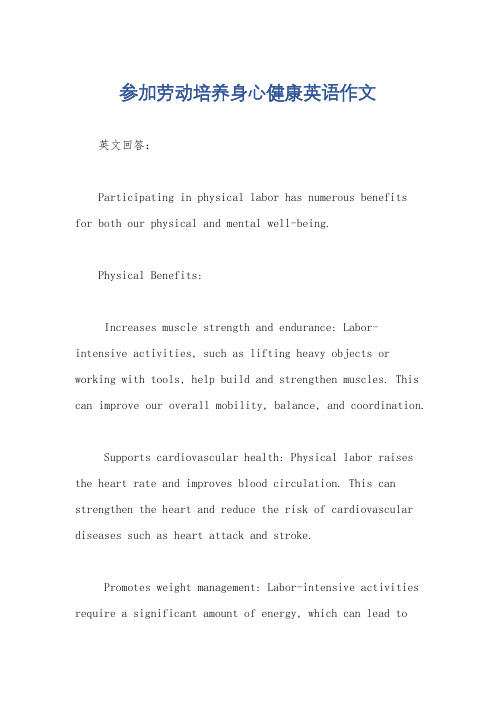
参加劳动培养身心健康英语作文英文回答:Participating in physical labor has numerous benefitsfor both our physical and mental well-being.Physical Benefits:Increases muscle strength and endurance: Labor-intensive activities, such as lifting heavy objects or working with tools, help build and strengthen muscles. This can improve our overall mobility, balance, and coordination.Supports cardiovascular health: Physical labor raises the heart rate and improves blood circulation. This can strengthen the heart and reduce the risk of cardiovascular diseases such as heart attack and stroke.Promotes weight management: Labor-intensive activities require a significant amount of energy, which can lead tocalorie burn and weight loss.Reduces risk of chronic diseases: Physical labor has been linked to a reduced risk of developing chronic diseases such as diabetes, arthritis, and osteoporosis.Mental Benefits:Improves mood and reduces stress: Physical activity has been shown to release endorphins, which have mood-boosting effects. Participating in labor-intensiveactivities can help reduce stress, anxiety, and depression.Cognitive benefits: Physical labor can stimulate blood flow to the brain, which can improve cognitive function, memory, and concentration.Enhances self-esteem and confidence: Completing physical tasks can give us a sense of accomplishment and boost our self-confidence. It can also provide a feeling of purpose and satisfaction.Fosters social connections: Participating in labor alongside others can create opportunities for social interaction and build relationships.How to Incorporate Physical Labor into Your Routine:Choose activities you enjoy: Labor-intensiveactivities should not feel like a chore. Find tasks that you enjoy and that align with your fitness level.Start gradually: Do not overdo it initially. Start with short periods of physical labor and gradually increase the intensity and duration as you become stronger.Listen to your body: Rest when needed and avoid pushing yourself beyond your limits.Find a support system: Having friends or family members participate in physical labor with you can provide motivation and accountability.结论:Participating in physical labor is a valuable and multifaceted activity that can significantly improve our physical and mental well-being. By incorporating labor-intensive activities into our routines, we can reap the numerous benefits it offers and lead healthier, happier, and more fulfilling lives.中文回答:参加劳动对我们的身心健康都有很多好处。
英语作文对劳动教育的看法
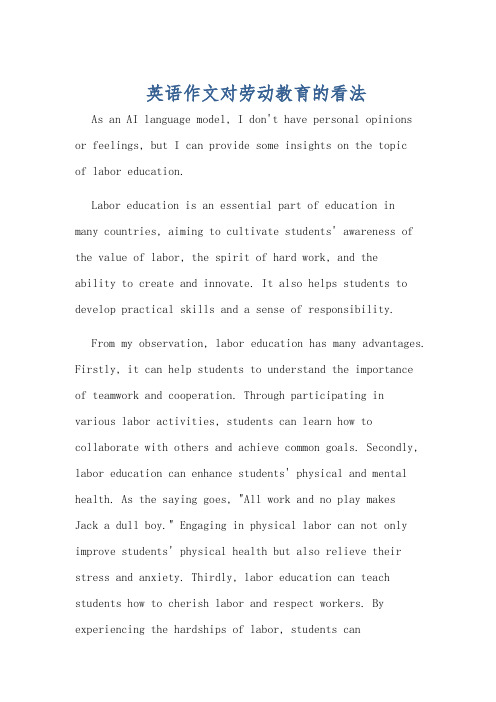
英语作文对劳动教育的看法As an AI language model, I don't have personal opinionsor feelings, but I can provide some insights on the topicof labor education.Labor education is an essential part of education in many countries, aiming to cultivate students' awareness of the value of labor, the spirit of hard work, and theability to create and innovate. It also helps students to develop practical skills and a sense of responsibility.From my observation, labor education has many advantages. Firstly, it can help students to understand the importanceof teamwork and cooperation. Through participating in various labor activities, students can learn how to collaborate with others and achieve common goals. Secondly, labor education can enhance students' physical and mental health. As the saying goes, "All work and no play makesJack a dull boy." Engaging in physical labor can not only improve students' physical health but also relieve their stress and anxiety. Thirdly, labor education can teach students how to cherish labor and respect workers. By experiencing the hardships of labor, students canunderstand the value of labor and develop a sense of gratitude towards workers.However, some people argue that labor education may affect students' academic performance and hinder their future development. They believe that students should focus on academic studies and leave the physical labor to professionals. Nonetheless, I think that labor education can complement academic education and enrich students' overall development. As long as schools can balance the workload and ensure students' safety, labor education can be a valuable and meaningful experience for students.总的来说,劳动教育对于培养学生的综合素质和社会责任感具有重要意义。
劳动教育有助于身体健康和健康的英语作文

Title: The Benefits of Labor Education on Physical and Mental HealthIn the contemporary society, where technology permeates every aspect of our lives, the significance of labor education has often been overlooked. However, the integration of labor education into educational curricula holds immense potential in fostering not just practical skills but also promoting physical and mental health. This essay delves into the multifaceted benefits that labor education can bring to an individual's overall wellbeing.Physical Health BenefitsFirstly, labor education plays a pivotal role in enhancing physical health. Engaging in physical labor, such as gardening, carpentry, or simple cleaning tasks, promotes physical activity and exercise, which are crucial for maintaining good health. In an era where sedentary lifestyles have become the norm, incorporating labor into daily routines helps combat obesity, cardiovascular diseases, and other health issues associated with inactivity. The act of moving one's body, lifting weights, and engaging in manual tasks strengthens muscles, improves flexibility, and enhances cardiovascular efficiency. Moreover, exposure to natural environments during outdoor labor activities can further boost physical health by improving air quality and reducing stress levels.Mental Health BoostBeyond physical benefits, labor education significantly contributes to mental health and emotional well-being. Engaging in purposeful activities that require focus, problem-solving, and creativity can act as a powerful stress reliever. The sense of accomplishment that comes from completing a task or seeing the fruits of one's labor can be immensely rewarding, boosting self-esteem and confidence. Additionally, labor education fosters resilience and perseverance, as students learn to overcome challenges and setbacks in their work. This mindset is invaluable in navigating the complexities of life and can help individuals develop a more positive outlook towards adversity.Social Skills and TeamworkFurthermore, labor education fosters social skills and teamwork, which are crucial for maintaining good mental health. Collaborating on labor projects encourages communication, coordination, and mutual support among students. These interactions help develop empathy, compassion, and a sense of community, all of which are vital for emotional resilience. By working together, students learn to appreciate diversity, respect others' opinions, and find common ground, fostering stronger interpersonal relationships.Appreciation for Work and ResponsibilityLastly, labor education instills a deep appreciation for hard work and personal responsibility. By experiencing the tangible results of their efforts, students come to understand the value of labor and the importance of contributing to society. This sense of purpose and responsibility can motivate individuals to lead more fulfilling lives, where they actively seek out opportunities to grow, learn, and contribute to their communities.In conclusion, labor education is a vital component of a holistic education system that not only equips students with practical skills but also promotes physical and mental health. By engaging in physical labor, students develop stronger bodies, healthier minds, and a deeper understanding of the value of work and responsibility. As educators and policymakers continue to emphasize the importance of well-rounded education, labor education should be prioritized as a means of nurturing healthy, resilient, and contributing members of society.。
劳动有利于健康的英文作文

劳动有利于健康的英文作文Labor is an essential part of our daily lives and has a significant impact on our physical and mental well-being. From the moment we wake up to the time we go to bed, we engage in various forms of labor, whether it is paid work, household chores, or recreational activities. While it is easy to view labor as a necessary burden, it is crucial to recognize the numerous benefits it can have on our health.One of the primary ways in which labor is beneficial to health is through its impact on physical fitness. Many forms of labor, such as manual labor or physical tasks, require the use of our muscles and cardiovascular system, which can lead to increased strength, endurance, and overall physical fitness. This, in turn, can reduce the risk of various health issues, including obesity, heart disease, and diabetes. Additionally, engaging in physical labor can improve our posture, balance, and flexibility, which can help prevent musculoskeletal problems and improve our overall quality of life.Moreover, labor can have a positive impact on our mental health as well. The act of completing a task or achieving a goal can provide asense of accomplishment and satisfaction, which can boost our self-esteem and overall well-being. This is particularly true for individuals who may be dealing with mental health issues, such as depression or anxiety, as the sense of purpose and achievement that comes with labor can help alleviate these symptoms.Furthermore, labor can also serve as a form of stress relief. When we engage in physical or mental tasks, our brains release endorphins, which are natural chemicals that can help reduce stress and improve our mood. This can be especially beneficial for individuals who may be dealing with high levels of stress, as it can provide a much-needed outlet for their emotions and help them to better manage their daily responsibilities.In addition to the physical and mental benefits, labor can also have a positive impact on our social well-being. Many forms of labor, such as team-based projects or community service, require us to interact with others and work towards a common goal. This can help to foster a sense of belonging and community, which can be particularly important for individuals who may be isolated or disconnected from their social networks.Moreover, the act of labor can also provide a sense of purpose and meaning in our lives. When we engage in work that we find meaningful or fulfilling, it can give us a sense of purpose and help usto feel more connected to our communities and the world around us. This can be particularly important for individuals who may be struggling with feelings of boredom or lack of direction, as it can help to provide a sense of purpose and direction in their lives.Finally, it is important to note that the benefits of labor are not limited to physical or mental health, but can also extend to our overall quality of life. When we engage in labor that we find meaningful and fulfilling, it can lead to a greater sense of satisfaction and well-being, which can have a positive impact on our relationships, our productivity, and our overall sense of happiness and fulfillment.In conclusion, labor is an essential part of our daily lives and has a significant impact on our physical, mental, and social well-being. From improving our physical fitness to providing a sense of purpose and meaning, the benefits of labor are numerous and far-reaching. By recognizing and embracing the value of labor in our lives, we can work towards a healthier and more fulfilling future for ourselves and our communities.。
我最擅长的劳动作文英语

我最擅长的劳动作文英语My Best Skill - an English Essay on Labor;Labor is an essential part of our lives. It involves the physical or mental effort that we put into completing tasks or activities. Each person has their own unique abilities and skills when it comes to labor, and today I would like to talk about my best skill in this area.The skill that I am most proficient in is organization. I have always had a natural inclination towards planning, sche ** ng, and ensuring that things run smoothly. Whether it's organizing my own tasks or coordinating group projects, I find great satisfaction in bringing order to chaos. One aspect of organization that I excel in is time management. I have developed effective strategies to prioritize tasks, set realistic deadlines, and allocate time for different activities. This skill allows me to stay focused and complete tasks efficiently. By managing my time effectively, I am able to balance my academic workload with extracurricular activities and personal commitments.Another aspect of my organizational skill is attention to detail. I have a keen eye for spotting errors or inconsistencies and am meticulous in ensuring that everything is in order. Whether it's proofreading a document, arranging items in a specific order, or creating a systematic filing system, I take pride in maintaining accuracy and precision in my work.Furthermore, I possess strong leadership skills, which complement my organizational abilities. I am able to effectively delegate tasks, coordinate team members, and ensure that everyone is working towards a common goal. Through clear communication and guidance, I strive to create a productive and harmonious work environment.In addition, my organizational skill extends to problem-solving. I am adept at identifying issues, analyzing them, and coming up with practical solutions. I can break down complex problems into manageable steps and systematically work towards resolving them. This skill has proven invaluable in various situations, both in academic settings and personal endeavors.Overall, my best skill in labor is organization. From time management and attention to detail to leadership and problem-solving, I have honed this skill over time and continue to enhance it. It allows me to work efficiently, effectively manage multiple responsibilities, and contribute positively to any task or project.In conclusion, labor is an integral part of our lives, and each person possesses unique skills in this area. My best skill in labor is organization, which encompasses time management, attention to detail, leadership, and problem-solving. Through this skill, I am able to bring order to chaos, ensure efficiency, and contribute positively to any endeavor.Thank you.。
关于劳动英语作文
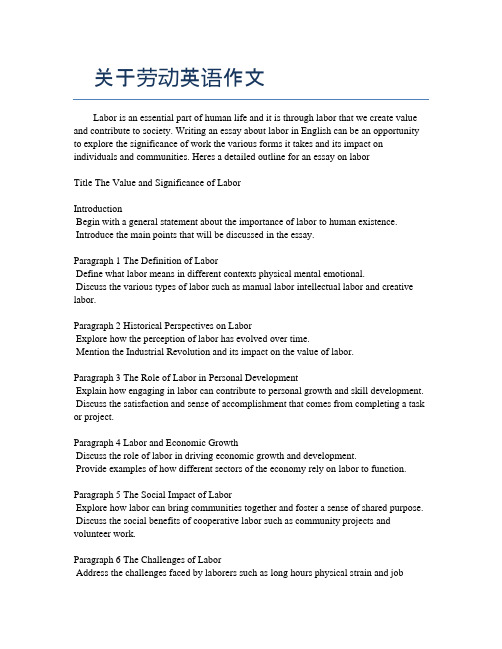
关于劳动英语作文Labor is an essential part of human life and it is through labor that we create value and contribute to society. Writing an essay about labor in English can be an opportunity to explore the significance of work the various forms it takes and its impact on individuals and communities. Heres a detailed outline for an essay on laborTitle The Value and Significance of LaborIntroductionBegin with a general statement about the importance of labor to human existence.Introduce the main points that will be discussed in the essay.Paragraph 1 The Definition of LaborDefine what labor means in different contexts physical mental emotional.Discuss the various types of labor such as manual labor intellectual labor and creative labor.Paragraph 2 Historical Perspectives on LaborExplore how the perception of labor has evolved over time.Mention the Industrial Revolution and its impact on the value of labor.Paragraph 3 The Role of Labor in Personal DevelopmentExplain how engaging in labor can contribute to personal growth and skill development. Discuss the satisfaction and sense of accomplishment that comes from completing a task or project.Paragraph 4 Labor and Economic GrowthDiscuss the role of labor in driving economic growth and development.Provide examples of how different sectors of the economy rely on labor to function. Paragraph 5 The Social Impact of LaborExplore how labor can bring communities together and foster a sense of shared purpose. Discuss the social benefits of cooperative labor such as community projects and volunteer work.Paragraph 6 The Challenges of LaborAddress the challenges faced by laborers such as long hours physical strain and jobinsecurity.Discuss the importance of labor rights and fair working conditions.Paragraph 7 The Future of LaborConsider the impact of technology and automation on the future of labor.Discuss the potential for new forms of labor to emerge as technology changes the nature of work.ConclusionSummarize the main points of the essay.Reiterate the importance of labor in shaping our lives and society.End with a call to action or a thoughtprovoking statement about the future of labor. Sample EssayThe Value and Significance of LaborLabor is the cornerstone of human progress shaping our societies and driving economic growth. It is through labor that we build create and innovate contributing to the betterment of our lives and the world around us.IntroductionLabor in its many forms is a universal activity that transcends cultural and geographical boundaries. It is the means by which we transform raw materials into finished goods ideas into reality and potential into achievement.Paragraph 1 The Definition of LaborLabor encompasses a wide range of activities from the physical exertion of construction workers to the intellectual challenges faced by scientists and the creative processes of artists. Each type of labor holds its unique value and significance.Paragraph 2 Historical Perspectives on LaborHistorically labor has been a subject of great debate and change. The Industrial Revolution for instance shifted the focus from individual craftsmanship to mass production altering the societal view of labor and its value.Paragraph 3 The Role of Labor in Personal DevelopmentEngaging in labor is not only about earning a living but also about personal development. It is through labor that we learn new skills overcome challenges and gain a sense of selfworth and accomplishment.Paragraph 4 Labor and Economic GrowthThe economic prosperity of a nation is closely tied to the labor of its people. From agriculture to technology every sector relies on the dedication and productivity of its workforce to thrive.Paragraph 5 The Social Impact of LaborLabor also has a profound social impact. It fosters a sense of community as seen in collaborative projects that bring people together to achieve common goals.Paragraph 6 The Challenges of LaborDespite its benefits labor also presents challenges such as long working hours physical strain and job insecurity. It is crucial to advocate for labor rights and fair working conditions to ensure the wellbeing of workers.Paragraph 7 The Future of LaborAs we look to the future the landscape of labor is changing with the advent of technology and automation. This shift will likely give rise to new forms of labor and redefine the relationship between humans and work.ConclusionIn conclusion labor is a multifaceted concept that holds immense value for individuals and society. As we continue to evolve it is essential to recognize and appreciate the role of labor in our lives ensuring that it remains a source of growth development and fulfillment for all.This essay provides a comprehensive exploration of the topic of labor highlighting its various dimensions and the importance of recognizing and respecting the labor of all individuals.。
英语作文劳动初二第三单元ai

英语作文劳动初二第三单元ai 英文回答:1. What is labor?Labor is a physical or mental exertion exerted to produce goods and services. It is a fundamental aspect of human existence, and it has been responsible for the development and progress of civilization.2. What are the different types of labor?There are many different types of labor, including physical labor, mental labor, skilled labor, unskilled labor, and professional labor. Physical labor involves using the body to perform tasks, such as construction, farming, and manufacturing. Mental labor involves using the mind to perform tasks, such as writing, teaching, and research. Skilled labor requires specialized knowledge and training, such as carpentry, plumbing, and electrical work.Unskilled labor does not require specialized knowledge or training, such as cleaning, sweeping, and mopping. Professional labor requires a high level of education and training, such as doctors, lawyers, and engineers.3. What are the benefits of labor?Labor provides many benefits to individuals and society as a whole. For individuals, labor can provide a sense of purpose, accomplishment, and financial security. It canalso help to develop skills and knowledge, and it can contribute to overall health and well-being. For society, labor is essential for the production of goods and services, and it helps to create jobs and economic growth.4. What are the challenges of labor?Labor can also present challenges for individuals and society. For individuals, labor can be physically demanding, and it can lead to injuries and health problems. It canalso be mentally stressful, and it can lead to burnout and other mental health problems. For society, labor can leadto inequality, exploitation, and discrimination.5. How can we improve the quality of labor?There are many ways to improve the quality of labor. One way is to invest in education and training. This will help to develop the skills and knowledge needed for higher-quality work. Another way is to improve working conditions. This will help to reduce the risk of injuries and health problems, and it will also help to improve morale and productivity. Finally, it is important to promote fairlabor practices. This will help to ensure that workers are treated fairly and that they receive a fair wage for their work.中文回答:1. 劳动是什么?劳动是人们为了生产产品和提供服务而付出的身体或脑力的活动。
劳动之美英文作文
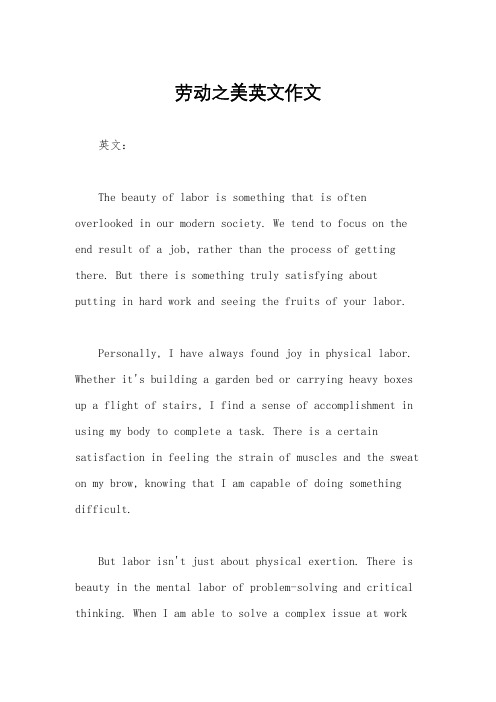
劳动之美英文作文英文:The beauty of labor is something that is often overlooked in our modern society. We tend to focus on the end result of a job, rather than the process of getting there. But there is something truly satisfying aboutputting in hard work and seeing the fruits of your labor.Personally, I have always found joy in physical labor. Whether it's building a garden bed or carrying heavy boxes up a flight of stairs, I find a sense of accomplishment in using my body to complete a task. There is a certain satisfaction in feeling the strain of muscles and the sweat on my brow, knowing that I am capable of doing something difficult.But labor isn't just about physical exertion. There is beauty in the mental labor of problem-solving and critical thinking. When I am able to solve a complex issue at workor come up with a creative solution to a problem, I feel a sense of pride in my abilities.Overall, I believe that the beauty of labor lies in the sense of accomplishment and satisfaction that comes from hard work. It's not always easy, but the feeling of pride and achievement is worth it in the end.中文:劳动之美是我们现代社会经常被忽视的东西。
英语作文我的一天五项劳动功能
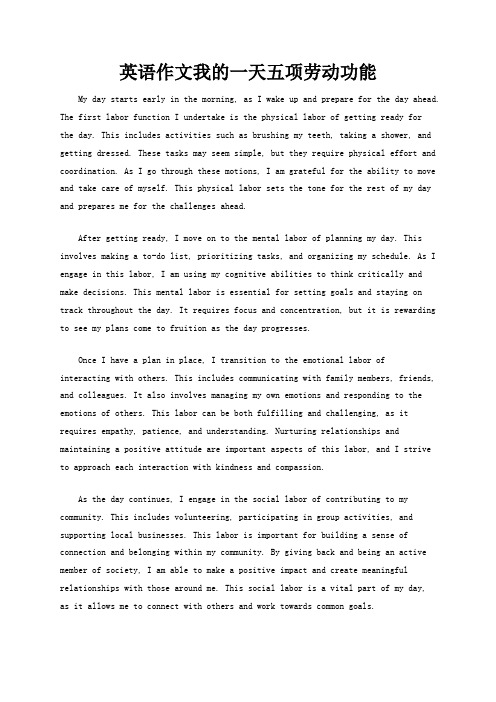
英语作文我的一天五项劳动功能My day starts early in the morning, as I wake up and prepare for the day ahead. The first labor function I undertake is the physical labor of getting ready forthe day. This includes activities such as brushing my teeth, taking a shower, and getting dressed. These tasks may seem simple, but they require physical effort and coordination. As I go through these motions, I am grateful for the ability to move and take care of myself. This physical labor sets the tone for the rest of my day and prepares me for the challenges ahead.After getting ready, I move on to the mental labor of planning my day. This involves making a to-do list, prioritizing tasks, and organizing my schedule. As I engage in this labor, I am using my cognitive abilities to think critically and make decisions. This mental labor is essential for setting goals and staying on track throughout the day. It requires focus and concentration, but it is rewarding to see my plans come to fruition as the day progresses.Once I have a plan in place, I transition to the emotional labor ofinteracting with others. This includes communicating with family members, friends, and colleagues. It also involves managing my own emotions and responding to the emotions of others. This labor can be both fulfilling and challenging, as it requires empathy, patience, and understanding. Nurturing relationships and maintaining a positive attitude are important aspects of this labor, and I strive to approach each interaction with kindness and compassion.As the day continues, I engage in the social labor of contributing to my community. This includes volunteering, participating in group activities, and supporting local businesses. This labor is important for building a sense of connection and belonging within my community. By giving back and being an active member of society, I am able to make a positive impact and create meaningful relationships with those around me. This social labor is a vital part of my day,as it allows me to connect with others and work towards common goals.Finally, as the day comes to a close, I undertake the emotional labor of self-care. This includes activities such as exercising, practicing mindfulness, and reflecting on the day. Taking care of my physical and mental well-being is essential for maintaining a healthy and balanced lifestyle. This labor allows me to recharge and prepare for the day ahead, and it is a time for self-reflection and personal growth.In conclusion, my day is filled with various forms of labor that contribute to my overall well-being and the well-being of those around me. From physical and mental labor to emotional and social labor, each function plays a crucial role in shaping my day and helping me lead a fulfilling life. By embracing these labor functions, I am able to navigate through the challenges of each day and find joy in the simple moments.。
- 1、下载文档前请自行甄别文档内容的完整性,平台不提供额外的编辑、内容补充、找答案等附加服务。
- 2、"仅部分预览"的文档,不可在线预览部分如存在完整性等问题,可反馈申请退款(可完整预览的文档不适用该条件!)。
- 3、如文档侵犯您的权益,请联系客服反馈,我们会尽快为您处理(人工客服工作时间:9:00-18:30)。
On Physical Labor
Have you ever thought about your own feelings when a sanitation worker approaches and picks up the bottle that you just threw away? It is a mixture of empathy, embarrassment, and even shame. This sort of feeling is so complex and painful to interpret that we even hesitate to think what lies behind. The gap between physical laborers and us, the so-called” mental workers” may be a problem more difficult to deal with than we could admit. Physical labor, in this complicated situation, may serve as a medium through which we college students may get rid of our sense of superiority and prejudice,if any, against physical workers.
Physical work is not something shameful; on the contrary, it may be the foundation of advanced mental achievement. The steam engine, for instance, is a combination of practical and mental work. Were it not for the long-time physical work experience, the prototype of steam engine would not exist. Were it not for the later brainwork, Watt couldn’t have improved the original model to the next level. Similar situation can be observed when we find that an experienced technician could probably make a better decision intuitively whereas an engineer might not even handle the problem. Through doing physical work, students will find that doing physical work also requires creative and analytical thinking. They
will also discover that the borderline between two kinds of work is not so distinct. Physical work, along with mental work, becomes a rather important component of innovation.
Despite the benefits of doing physical work, a considerable number of college students may be prejudiced against physical workers. Just investigate deeply into the thoughts of people around you. It won’t take you long to realize that we hold prejudice that even ourselves are not aware of: their shabby clothes, their dirty hands, their smelly body...All these irrational feelings and insufficient knowledge of physical workers constitute an inaccurate stereotype of physical workers, which eventually leads to prejudice. This issue can be readily solved if and only if college students devote more to physical work. Only thru physical work can we gain further insight into the lives of physical workers with our own eyes and make our own judgment. If you communicate more with these poor men who depart from their home to come to the metropolis for a living via physical work, you may be able to have a better understanding of them, which helps a lot in the elimination of prejudice.
Having dealt with prejudice, here comes the difficult part—superiority. While prejudice is merely a performed opinion that can be corrected once we learn more about
those workers, superiority is something that sticks with us even if we know where it derives from. We all, more or less, covertly or overtly, display a certain sense of superiority over physical workers. Considering the higher pay, the seemingly more decent way of life and the higher degree of education, this phenomenon is actually quite understandable. If we look inside this issue, we will see that superiority, as its meaning suggests, exists to make us feel better. We may not really think that they are inferior to us, but the fact that we live a better life is so comforting that we may unconsciously obtain a sense of superiority. It is through physical work that we learn to gradually accept the fact that these people haven’t reached our living standard due to the lack of opportunities rather than their intelligence. We may never get rid of this superiority completely, but we can diminish it as much as possible with physical work.
Once you determine to engage yourself in more physical labor, get prepared for its numerous advantages: a healthier body, richer social experience, and most importantly, a different way to view this social class and the whole society apart from prejudice and superiority. Open your arms to embrace your new friends, and prepare yourself for a more harmonious world.
注意事项:
1.这篇文章截取了两个框架,因此还得重新拼一下outline。
第一段总领全文,二三四段为supporting idea,最后一
段结尾并说明好处。
Example什么的大家根据文章填进
去吧。
粗体为该文、段主题句,写完outline后麻烦处理
变回普通字体。
2.鉴于editor顺序不明,封面未制作。
望确定顺序后按老师要求做好~
3.最后一个editor做好后麻烦打印一份纸板,周二上课交~。
